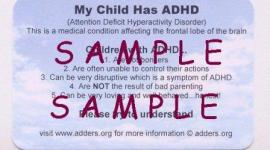Employment Accommodations for Adults with ADHD

How to effectively deal with hiring and employment issues when you are an adult with ADHD.
Barriers to Employment
People with ADD/ADHD have difficulties with communication, social interaction, and imagination. Consequently, both finding out about job opportunities and retaining a job can present problems for many people with ADD/ADHD. The problems arise from the lack of available information, advice, and practical support that is ASD-specific. In many instances ADD/ADHD is a hidden disability; other people not aware of the nature of the person's disability may easily misunderstand them.
Overcoming barriers to recruitment
For a person with ADD/ADHD, the Disability Employment Adviser (DEA) in a local Jobcentre Plus office is often the key person to contact about training and job opportunities. They know the law about disability and some of the difficulties that all people with a disability face in looking for a job. The Department of Work and Pensions has an Access to Work programme, which aims to meet the additional employment costs resulting from disability, for example, the costs of making reasonable adjustments in the workplace. Employees and employers may apply through the local Access to Work Business Centre or the DEA.
Employers may find that changes could easily be made to their current practice in recruitment. Job adverts often contain confusing jargon, or stipulate unnecessary qualifications or exceptional communication skills which are not needed for the job. Clearly worded adverts listing only the skills/qualifications that are absolutely essential would be better.
Most employers use an interview for selection. This relies on communication and social interaction skills, areas of difficulty for a person with ADD/ADHD. A work trial instead of a formal interview might be a fairer alternative. Where interviews take place, it is possible to adapt the format of the questions to make them easier to understand. Basing questions on past experience rather than hypothetical situations would draw out what the person already knows, rather than asking him or her to imagine how they would deal with a situation not yet met. Some people with ADD/ADHD have problems in processing information and would benefit from extra time in selection tests.
Adjustments in the workplace
From 1 October 2004, the Disability Discrimination Act (DDA) 1995 will be extended to include employers of any size (except the armed forces) and all employers will have a duty to make reasonable adjustments for people with disabilities. However, managers may not realize how readily and economically reasonable adjustments can be made which would accommodate a person with ADD/ADHD among their workforce.
People with ADD/ADHD may process information more easily if written down rather than spoken, so learning the job can be made easier by supplying written guidelines rather than verbal ones. Clear guidance on what is expected of the employee is essential. Many people with ADD/ADHD prefer a timetable indicating what to do when, and a plan of the order in which tasks should be done.
Some other examples of effective adjustments that might meet the needs of particular individuals with ADD/ADHD are:
- Structuring the job by breaking it down into parts
- Providing clear and structured training
- Being flexible with work times.
- A plan of who sits where in the office could be helpful.
- Giving regular feedback that includes positive experiences, as well as advice on how to do things differently is important.
A short meeting between the employer and an ADD/ADHD adviser who could be either the Disability Employment Adviser (DEA) or someone who has a good knowledge of the condition, and the prospective employee can be helpful as accommodations can be looked into in advance.
Accommodations such as the employer agreeing that the person with ADD/ADHD is allowed the ability to use a closed office, for some time during the day to complete any paperwork that is needed, can enable the employee to know that there will always be a set time when the paperwork can be done without distraction. The reason for this is that a closed room will have fewer distractions and phones can be turned off enabling the Person with ADD/ADHD to have a set time where they can focus and concentrate to complete any specific written work.
The ability to take short breaks - maybe every 20 -30 minutes so that they are then able to get back to tasks with more ability to focus and concentrate, if this is granted they will probably achieve more in 2 half hour slots with a 5 minute break than others can do in a full hour slot.
The ability to flexible work hours is also something to be considered - as if the person with ADD/ADHD is on medication then they will be able to give there best when this is working so a flexible start time to give time for this to start working in the morning and then the ability to continue later can sometimes be helpful.
All accommodations depend on the individual and the workplace but most things can be worked through and accommodations implemented if a bit of time is taken to discuss things in a bit more detail before problems arise.
Provision of a mentor to discuss problems or a job coach for support in the workplace can help. The Government's Access to Work scheme could make job coach help available. A mentor or manager could give guidance on the social or unwritten issues/rules in the workplace, as these could cause much confusion to someone who does not pick these up intuitively. In some people ADD/ADHD can be a hidden disability, and the difficulties in communication and social interaction they have could result in others misunderstanding them, so training in disability awareness for colleagues is a good idea.
Benefits to the employer
Employers can benefit from the skills and qualities a person with ADD/ADHD might bring to a job in their company. Especially if they are willing to invest a bit of time and effort into getting to know the person and can build up their trust.
People with ADD/ADHD need high levels of stimulation so often find working in an ever-moving environment such as sales really good and they can become top salespeople. Other employment where stimulation levels are kept high are also very good. People with ADD/ADHD are hard working especially when properly motivated. Their attention to detail can be very good, if they are working on something which is of particular interest or if the work is stimulating; they can maintain a high level of accuracy. Their approach is generally straightforward and honest. They may have technical skills of a high order and a good knowledge of facts and figures.
A sound business case can be made for employing more people with ADD/ADHD. The firm gains reliable and effective employees, progresses towards meeting its commitment to diversity, and raises awareness of diversity among its staff. Managers who have gained an understanding of the communication difficulties people with ADD/ADHD experience have commented that they have learned to communicate with their whole team more effectively. By becoming a socially responsible employer good internal and external PR is also achieved.
APA Reference
Staff, H.
(2008, December 23). Employment Accommodations for Adults with ADHD, HealthyPlace. Retrieved
on 2026, March 1 from https://www.healthyplace.com/adhd/articles/employment-accommodations-for-adults-with-adhd


